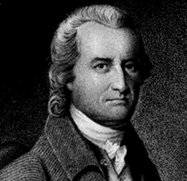Wolcott, Oliver

Oliver Wolcott was born in 1726 to an important Connecticut politician, Roger Wolcott. After graduating from Yale in 1747, he commenced a military career, serving as a militia captain in King George’s War (1740-1748). His conquest against the French was unsuccessful, however, and he returned home. Initially, he worked on medical studies with his brother, but he later turned to law instead.
Wolcott’s work in the public sphere began in 1751 when he held the position of county sheriff (until 1771). He also served as a member of the upper house in the colonial State legislature from 1771 until 1786, and between 1774 and 1778, he was the county judge. Wolcott attended the Continental Congress from 1775 until 1783. Due to illness, he was not present to vote on independence, and he was also unable to make it to the formal signing of the Declaration of Independence on August 2, 1776. His signature was added a few months later though, in October of 1776.
After the war, Wolcott continued to be politically active. He was Lieutenant Governor from 1787 until 1796, and he attended the ratifying convention of the United States Constitution. In 1797 he passed away at the age of seventy-one. He was buried in Litchfield Connecticut’s East Cemetery.
 >
>